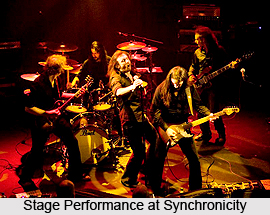 Synchronicity is one of the most popular and cherished musical events of India. It is the rock music festival of the annual cultural festival of IIT Kanpur, known as Antaragni. It is enlisted amongst the most famed college festivals of India. This three day long festival is held in the month of October and invites the participation of more than 400 rock bands of the country. Synchronicity is accredited as the flagship event of Antaragni and is completely funded by the students of IIT Kanpur.
Synchronicity is one of the most popular and cherished musical events of India. It is the rock music festival of the annual cultural festival of IIT Kanpur, known as Antaragni. It is enlisted amongst the most famed college festivals of India. This three day long festival is held in the month of October and invites the participation of more than 400 rock bands of the country. Synchronicity is accredited as the flagship event of Antaragni and is completely funded by the students of IIT Kanpur.
History of Synchronicity
Synchronicity started off in the year 1988 as a simple rock band competition and gradually gained the stature of one of the biggest college rock music festivals of the country. It attracts numerous rock bands from nooks and corners of India. In the year 2007, the event went international with the participation of `Poets of the Fall`, the Finnish rock band. Several top rock bands of India had received an excellent launch pad through Synchronicity. It also served as a platform for the Indian music band Parikrama which began its musical journey by winning Synchronicity in early 1990s. Their victory at the event earned them huge fame paving their way for international performances in which they gained critical appreciations. Over years, different editions of Synchronicity witnessed splendid performances of various national as well as international rock bands including Glyder, Jaded Sun, Them Clones, Weapon Shop, Swanee River, Solstice Coil and many others.
Stages of Synchronicity
Synchronicity comprises of several stages inviting the participation of numerous rock bands for a musical battle. Various events and elimination processes are conducted which decide the winner of Synchronicity. At the closing, Synchronicity cherishes special performances by guest bands.
Stage 1: Zonal Eliminations (Road-trip)
In the first stage, also known as Roadtrip, the country is divided into four zones namely Delhi, Kolkata, Bengaluru and Mumbai. From each zone more than 100 bands make registrations for the competitions among which 12 are selected from each zone. These selected bands perform at the Roadtrip shows held in the city and finally 3 bands get selected for the second round which is organized at IIT Kanpur.
Stage 2: National Eliminations
The bands shortlisted at zonal eliminations then compete at the national elimination for two days. This event is organized at IIT Kanpur during Antaragni. This competition finally selects only four bands for the grand finale. In the grand finale these bands perform as opening act to the international headlining acts.
Stage 3: The Final Night
In the grand finale the four selected bands get the opportunity to open for the international headliner of Synchronicity. In this final stage they battle to achieve the title of Synchronicity winner which is followed by prize money of worth five lacs. Finally the members belonging to the featured international bands judge and headline the event.




















